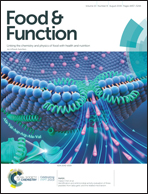Sourdough technology as a novel approach to overcome quality losses in sugar-reduced cakes
Abstract
Sugar reduction in sweet baked goods is one of the most popular trends on the food market. However, reducing sugar without lowering the product quality with respect to sweetness, texture and microbial shelf life is challenging. Sugar alcohols are one group of sugar replacers which maintain the bulk and contribute to sweetness. Nevertheless, alternative approaches, particularly those that are seen as ‘clean label’, are highly demanded. Hence, the natural, in situ production of mannitol in a sourdough system was performed and its potential as a functional ingredient to improve the product quality of a sugar-reduced cake was investigated. A full sugar cake (C1), a 50% sugar-reduced cake with wheat starch (C2) or with commercially available mannitol (C3) were considered as controls. The substitution of sugar by wheat starch or mannitol caused lower specific volume (−15.5%; −10.7%), a harder crumb (+17.1 N; +4.4 N), less browning, a shorter microbial shelf life (−5.7 days; −4.3 days) and poorer sensory properties. The incorporation of sourdough in C2 improved the pasting properties by decreasing the peak viscosity. Moreover, it resulted in a similar specific volume to the full-sugar control, contributed to significantly softer crumb (−8.6 N) and increased browning compared to C2. Sensory evaluation revealed an increased sweetness perception (+93%), aroma (+30%) and flavour (+25.5%) by the incorporation of sourdough. Although sourdough incorporation improved sugar-reduced cakes, the quality characteristics of the full-sugar control could not be achieved in this study. In conclusion, the addition of sourdough in amounts lower than 10% can be considered a useful tool to improve specific volume, crumb structure, colour, taste and flavour, as well as shelf life of sugar-reduced cakes.



 Please wait while we load your content...
Please wait while we load your content...